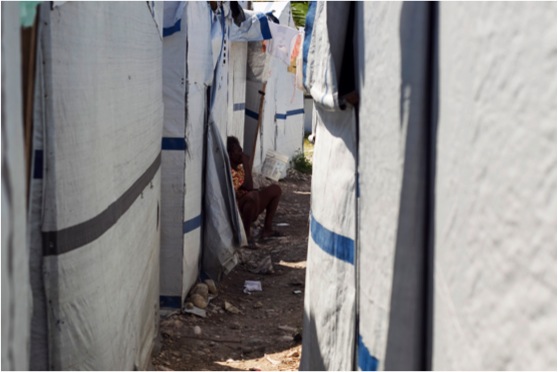Op-Ed: Jake Johnston on Humanitarian Aid in Haiti: Supply and Demand
Above: A woman sits in front of her home at a camp for persons displaced by the January 2010 earthquake in Port-au-Prince (UN Photo/Logan Abassi)
By Jake Johnston
Op-Ed Contributor
“Donors and aid organizations prefer to be the boss of their own money. And they want to be in charge of how to spend it, where to spend it, and if to spend it at all,” Linda Polman, author of The Crisis Caravan: What’s Wrong with Humanitarian Aid, recently told an interviewer. The statement goes to the root of what many believe has been the greatest failure of the relief effort in Haiti: the exclusion of Haitian voices from the decision making process.
As the two-year anniversary of the earthquake approaches, hundreds of thousands of earthquake survivors remain in camps with little or no basic services. Even though many aid organizations still have large pools of funds, some are pulling out of camps and discontinuing essential services such as the provision of water and sanitation. 125,000 transitional-shelters (T-shelters), small structures meant to last up to a few years, are expected to be built eventually, but this number is based on what NGOs pledged, and not the needs on the ground. The result is that, even after these shelters are completed, hundreds of thousands of people will still be left solely with “emergency” solutions, generally not much more than one or two tattered tarps, that were meant to last no longer than a few months.
With billions of dollars pledged and conditions in camps still deteriorating, the question remains: where is the money, and has it met any of the real needs of the Haitian people? This is the subject of an upcoming documentary by Michele Mitchell and her team with Film@11 airing on PBS in January. Mitchell told me “one thing I heard constantly, first from Haitians and then even from some aid workers, was that the Haitians in the camps, the people who the relief money was supposed to help, were almost entirely excluded from the planning process. If the NGOs weren’t asking questions, how did they know the right thing to do?” In Haiti: Where Did the Money Go? The viewer is taken from interviews with some of the largest NGOs operating in Haiti to interviews with those in the camps. The juxtaposition of the grandiose accomplishments listed by the NGOs (and the lifestyles which some aid workers have) with the squalid living conditions in the camps makes clear the severe disconnect between the Haitian people and those who are supposedly there to help.
The problem is not simply with NGOs, but with donors as well. And it is largely systemic. As an aid worker from one of the largest relief organizations in Haiti told me, “[t]he NGO pool in the last ten years has turned from a pool of actors to a pool of contractors,” adding, “[p]eople fly from crisis to crisis at ten cluster meetings and write proposals for funding… If they generate a contract they deliver a job, if they don’t then they piss off.” With all the scrambling around for money and proposal writing, one critical voice is left out: the beneficiary’s.
Nowhere is this clearer than in the provision of shelter, which remains the most glaring failure of relief efforts nearly two years after the quake. An independent evaluation of agencies providing shelter, commissioned by the International Federation of the Red Cross, illustrates this disconnect clearly. The evaluation finds that shelter provision was based more on supply, i.e. what NGOs wanted to deliver, as opposed to demand, i.e. what Haitians actually needed. “Affected people were not consulted nor their capacities considered, the response was what those with the [foreign] money decided,” one Haitian interviewee told the evaluation team.
The construction of transitional shelter was constrained by the tremendous amount of rubble clogging the capital and while the evaluation found that “money was not an issue for the shelter response,” there was very little allocated to rubble removal. Why? In the words of the evaluating team, “donors… had already allocated their funds for T-Shelter construction,” while NGOs were “reluctant to spend their privately-raised funds.”
Perhaps a new T-shelter makes for a better fundraising picture than a wheel-barrow of cement.
Meanwhile, as the construction of “T-shelters” was delayed further and further and conditions in the camps continued to worsen, NGOs either would not, or could not change tack. This was due to “commitments with donors” as well as an “unwillingness to work in other transitional shelter options,” according to the evaluation. It’s better PR to put your NGO logo on a new T-shelter than on a rental subsidy or repaired home.
As for the shelter that has been provided, family size was not considered and a two-tarps-per-family standard for “emergency” shelter was not based on families’ actual ability to create an adequate shelter. Unsurprisingly, the result was that “emergency and interim shelter did not enhance protection or reduce the risks of gender-based violence, including sexual exploitation and abuse.” In fact, as the evaluation team explains, nearly “all the participants in the focus groups described the conditions of the emergency shelter solution as ‘infrahuman’, ‘unbearable’, or simply ‘very bad.’”
As the two-year commemoration of the earthquake approaches, there will be numerous reports on the billions of dollars raised by NGOs or pledged by donors, and how relatively little of it has been spent on the ground. Certainly, anyone donating $10 to a relief organization probably assumed it would be spent to alleviate the massive suffering caused by the earthquake. Two years later, the suffering continues and hundreds of millions of dollars are sitting in interest-bearing accounts. It’s an appalling situation that should be investigated by the US Congress, but equally troubling is the growing evidence that much of the money that has been spent has failed to address the real needs of the Haitian people.
To this day, there is no meaningful plan to deal with the housing crisis and the hundreds of thousands who remain displaced. Despite the billions pledged and donated, the little that has reached the ground has failed to sustainably address the issue. If solutions are to be found, and Haitians’ rights are to be respected, foreign donors and NGOs should begin by listening to those they are in Haiti to help and start reacting to demand, not supply.
Jake Johnston is an international researcher at the Center for Economic and Policy Research. He writes on Haiti-related issues for the blog Relief and Reconstruction Watch.
Note: the opinions expressed in Caribbean Journal op-eds are those of the author and do not necessarily reflect the views of the Caribbean Journal.







